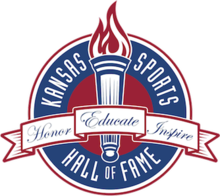Kansas Sports Hall of Fame
 |
|
| Location | Wichita Boat House, 515 South Wichita Street, Wichita, Kansas 67202 |
|---|---|
| Coordinates | 37°40′51″N 97°20′29″W / 37.68083°N 97.34139°WCoordinates: 37°40′51″N 97°20′29″W / 37.68083°N 97.34139°W |
| Website | kshof |
The Kansas Sports Hall of Fame is a museum located in Wichita, Kansas, dedicated to preserving the history of sports in the state of Kansas. The museum provides exhibits, archives, facilities, services, and activities to honor those individuals and teams whose achievements in sports brought distinction to themselves, to their communities and to the entire state of Kansas.
The Hall of Fame was founded in 1961 as part of the Kansas Centennial Celebration. The museum has had a number of homes over the years, and is now located in Wichita, at 238 N. Mead. Funding for operating expenses is provided in part by donations, admissions, gift shop sales, and special events. The 27,000-square-foot (2,500 m2) museum is not only a family attraction, it is also a facility for entertaining. The Hall can be used for special events, receptions, and conferences in a variety of settings.
In June 2009 the museum announced the creation of the Kansas Sports Museum, located at The Chisholm Trail Center in Newton, Kansas. The Hall of Fame also announced that it would be moving from its current location at 238 N. Mead to the Wichita Boathouse as part of a cost-saving measure through an agreement with Bill Koch, whose 1992 America's Cup winning yacht America³ is on display there. The new museum in Newton will occupy 21,000 square feet (2,000 m2) in the Chisholm Trail Center, 601 SE 36th St. (I-135 Exit 28). It will house exhibits and memorabilia the hall of fame won’t have room for after it moves to its new location at the Wichita Boathouse.
The Museum in Old Town Wichita is currently closed while the moving and renovation processes are taking place.
Kansas is called the "Cradle of Basketball." Basketball’s inventor, James Naismith, the namesake of the Basketball Hall of Fame is featured prominently in this area of the museum. Legendary coaches such as Phog Allen, Adolph Rupp, Dean Smith, Ralph Miller, Ted Owens, Eddie Sutton, Jack Hartman, Tex Winter, Gene Keady, Jack Gardner, Dutch Lonborg, John McLendon, Ralph Nolan, Bill Morse, Ron Slaymaker, Bob Chipman, and Walt Shublom are also showcased.
...
Wikipedia
